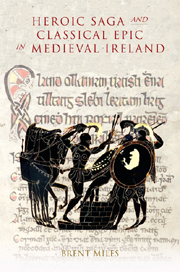Book contents
- Frontmatter
- Contents
- Acknowledgements
- Note on Texts and Editions
- Abbreviations
- Introduction: Figmenta Poetica and Heroic Saga
- 1 Classical Learning in Medieval Ireland: The State of the Question
- 2 The Irish Classical Tales: Texts and Sources
- 3 Classicism and Togail Troí
- 4 Táin Bó Cúailnge and Latin Epic
- 5 The Rhetorical Set Piece and the Breslech of the Plain of Murthemne
- Afterword: An Invitation to Study
- Bibliography
- Index
- STUDIES IN CELTIC HISTORY
3 - Classicism and Togail Troí
Published online by Cambridge University Press: 12 September 2012
- Frontmatter
- Contents
- Acknowledgements
- Note on Texts and Editions
- Abbreviations
- Introduction: Figmenta Poetica and Heroic Saga
- 1 Classical Learning in Medieval Ireland: The State of the Question
- 2 The Irish Classical Tales: Texts and Sources
- 3 Classicism and Togail Troí
- 4 Táin Bó Cúailnge and Latin Epic
- 5 The Rhetorical Set Piece and the Breslech of the Plain of Murthemne
- Afterword: An Invitation to Study
- Bibliography
- Index
- STUDIES IN CELTIC HISTORY
Summary
Narrative Genre and Tale-Types
In his influential ‘Towards a history of classical influences in Ireland’, William Stanford did much to popularize the view that the classical tales in Irish were attempts to construct typical Irish scéla out of material inherited from classical antiquity. The argument rests on the conviction that the classical tales were intended as entertainment for a class whose aesthetic tastes are already exampled for us in the native prose literature of Middle Irish. While some adaptation to Irish convention is unmistakable in this corpus, the argument for gaelicization has been refined in recent criticism by the assertion that the classical tales, for all their affinity with the native scél, belong properly to the field of medieval Irish historiography. Leslie Diane Myrick has argued that the drive to translate Latin epic in Ireland was conditioned by the belief that the poems of Virgil and Statius were, like the Alexander and Troy texts, works of history. Poppe has even suggested that the occurrence of several of the tales together in the Book of Ballymote is evidence that the classical tales were thought of as a distinct group, even an historical cycle in agreement with the French model.
A strict division between history and literary fiction, however, is, as Poppe reminds us, hardly valid for medieval texts. For example, Poppe has demonstrated how medieval Irish audiences might have had an expectation for the presence of allegory, even in native texts ostensibly given over to a plain narration of events from Irish history.
- Type
- Chapter
- Information
- Heroic Saga and Classical Epic in Medieval Ireland , pp. 95 - 144Publisher: Boydell & BrewerPrint publication year: 2011



